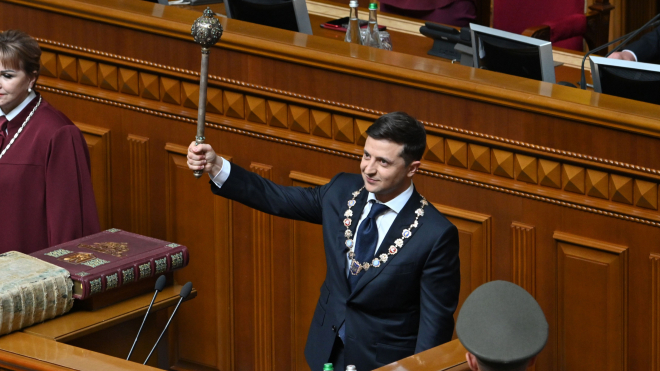Will the president lose his powers after May 20, 2024?
Absolutely not. The president and the parliament will continue to exercise their powers in full until the next elections. This norm is prescribed in the law on martial law. It expressly forbids terminating the powers of state authorities: the president, the Verkhovna Rada, the Cabinet of Ministers, the National Bank, the ombudsman, prosecutorʼs offices, and investigative bodies.
The Constitution is superior to the law on martial law. And it only talks about the Verkhovna Rada, whose powers continue during the war. There is no such thing about the president.
And there doesnʼt have to be. The Constitution does have a provision that during martial law, the Verkhovna Rada continues to work even if its term of office has expired. Lawyers call this the principle of continuity, and it applies to all higher authorities.
If you start looking for it in the Constitution, you wonʼt find it in this wording. The Constitution states that the president exercises his powers until the next newly elected president of Ukraine takes office. Similarly, the Cabinet of Ministers submits its mandate to the new parliament, but continues to work until the new government is appointed. The Verkhovna Rada also continues to work even after the elections, until the new deputies are sworn in.
"The main principle is that there cannot be a vacuum of the highest state power even in peacetime, and even more so in wartime — this is guaranteed by the Constitution of Ukraine," Stanislav Shevchuk explains. And he adds: if there is no mention of martial law in the Constitution in the article on the powers of the president, this doesnʼt mean that the Constitution contains a gap — everything operates according to the principle of continuity of power.
The Constitution provides for exceptional cases in which the powers of the president may end: if he resigns; if he cannot perform his duties due to his health condition; if he was impeached; if he died. There are no other circumstances, such as, for example, the end of a 5-year term in office.
As for the law "On Martial Law", in Ukraine there is a presumption of constitutionality of the law — it complies with the Constitution until the Constitutional Court finds otherwise. That is, the rule of law that the powers of the president are extended during martial law does not contradict the Constitution.
One of the authors of the Constitution, Roman Bezsmertny, answers the question why the Parliament and its powers were mentioned in the Constitution, but not the President: the rule on the Verkhovna Rada was written specifically to strengthen its role and prevent possible attempts to usurp power during the war.
But the Constitution stipulates that the regular elections of the President of Ukraine are held on the last Sunday of March in the fifth year of the President of Ukraineʼs term of office — the fifth year has already arrived. And this norm is higher than the law on martial law.
And again no. Elections are essentially the right to vote and be elected. This is one of the basic civil rights of a person, stipulated by the Constitution and one of the basic principles of democracy. But legal scholars have been talking about the balance between human rights and state security for a long time. And they say that in some cases security, state sovereignty and territorial integrity come first.
"Our Constitution is not a suicide pact, it cannot be read or interpreted in such a way that it could destroy our state or significantly weaken it during mortal danger from an external enemy," says Babelʼs interlocutor in the Constitutional Court and adds that this is the doctrine and practice of all democratic states.
Also, according to the Constitution, elections must be free, fair, and transparent. In the conditions of martial law, when some of the voters are abroad, some are in the occupied territories, and some are at the front, when polling stations cannot work normally due to air raid alarms and shelling, when observers cannot work freely, the elections will not be considered democratic.
Roman Bezsmertny adds: during the war, the president exercises the authority of the supreme commander. For example, he heads the Staff, which for a special period becomes the highest collegial body of the military leadership of the countryʼs defense. And there are no mechanisms for replacing the head of the Staff in the legislation.
Therefore, only after the end of the martial law, the parliament will schedule elections for the president and the Verkhovna Rada within 90 days.
Translated from Ukrainian by Anton Semyzhenko.
Jurisprudence and laws are not easy. We will always explain complicated things to you in simple words and help you to resist Russian propaganda. Support Babel: 🔸 in hryvnia, 🔸 Buy Me a Coffee, 🔸 Patreon, 🔸 PayPal: [email protected].
